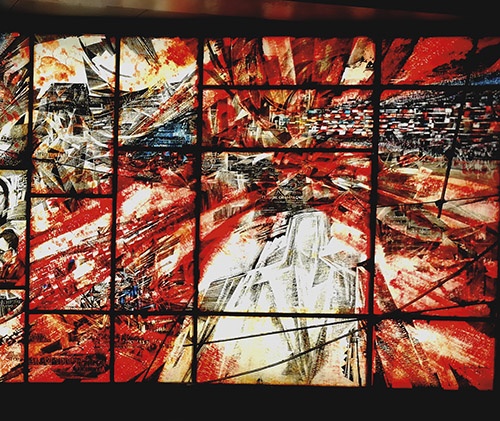 Retis/Flickr, CC BY 2.0
Frédéric Back, L’Histoire de la musique à Montréal (section), 1967.
Retis/Flickr, CC BY 2.0
Frédéric Back, L’Histoire de la musique à Montréal (section), 1967.
The Shape Of A Scene
Letter from Montreal
Walking along the green path, I’m filled with a predictable anxiety. The show has already started and I’m going to miss the opening act. They’re earnest and jangly, good for a sun going down. Who starts a show at six, I think, but I know that in a pandemic the rules of nightlife come unhooked from time and space.
I check my texts for more information. Who’s there? Have they gone on yet? And where, actually, am I going? I feel nineteen, like I’m showing up at a DIY venue to admire the outfits and scroll on my phone. The path curves west along the train tracks and I look up at the Rosemont overpass. A fuzz drifts through the air.
I played my first local show in 2014, the year after I moved to Montreal. The more I went to gigs here, the more I got to know the contours of a scene: which venues had reliable sound, who would put you on guest list, who would never remember your name. The thrill of a set that catches you off guard. I was grateful to live in a city with reasonable rent and warehouse space, where there was always something going on, even in twenty below.
“A scene resists deciphering,” writes cultural scholar Will Straw, “in part, because it mobilizes local energies and moves these energies in multiple directions.” For Straw, scenes indicate an excess—some surplus energy that cannot be channelled into the standard spaces of school, work, home. Moving through this excess, I often felt like I didn’t have the right look or taste to be showing up at all. I blamed the discomfort on Montreal, a city too busy being cool, and admired people who seemed to go from show to show with ease, like they had it all mapped out.
Local musician Joni Sadler, who passed away suddenly last year, built on Straw’s work in her master’s thesis, a study of experimental artists. Her interviews with musicians found that they often valued social and cultural capital more than economic definitions of success. “A healthy music scene can lead to a shared sense of purpose,” Joni wrote. “What this may risk, in some cases, is the conscious or unconscious formation of boundaries at the perimeters of a music scene.” Scenes can be both liberating and lonely.
As I got older, my experiences in music started adding up to something more than a series of nights gone well or poorly. In 2017, Joni hired me to work at CKUT, McGill’s campus radio station. I spent my days listening to piles of mail-in CDs with Joni and the volunteers, getting to know Montreal’s expansive jazz, francophone and hip-hop scenes. Outside of the station, I played in more projects, while my friends worked for local festivals and promoters. It felt like something close to community.
Communities, of course, are never static. As rent in Montreal rises and the city focuses on large-scale ventures, the shape of a scene changes. I can name at least eight independent venues that have recently shut down or been bought out. Sometimes scenes are broken by their own internal logics, too. Prioritizing cultural and social capital over economics opens up space for alternative modes of art and care. It can also foster competition and betrayal. Informal hierarchies emerge; abuse goes unchecked; patterns of marginalization persist. And scenes change when people change. Some of my friends have left town, some have stopped playing music, and some have stopped talking to me, or vice versa.
People also keep making shit. They book shows and rent generators and convince opening acts to go on at 6 PM, so that the headliners might play before the cops show up. And so that I will leave my house on a Friday night.
Scenes are shaped by material circumstances, but their essential excess comes from people. Like my friend Joni, who believed very much in strange sounds, and always opened the perimeters to let someone new in the shape. There’s no one version of a community. Excesses spill across boundaries.
I keep walking west down the tracks, following the fuzz. A group emerges near a makeshift stage, and the sound is huge and enthralling. I find a spot by a tree, open a beer, and look around at the crowd, until a familiar face appears. ✲
Rosie Long Decter is a writer and musician based in Montreal. Her work has appeared in THIS, the New Quarterly, Xtra, Herizons and elsewhere. She performs regularly with her band Bodywash and sings backup in a Fleetwood Mac cover band.





